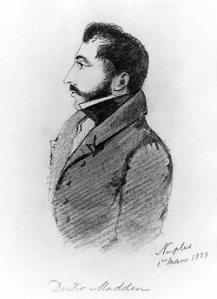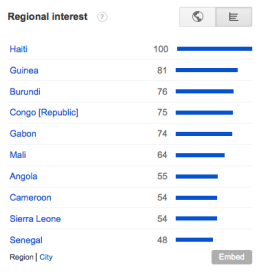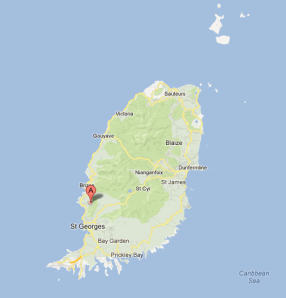Archive
“The Black Irish of Montserrat” Radharc Documentary and Caribbean Irish Comparison
Originally broadcast in 1976, the Radharc (Irish, meaning look, scene, spectacle) documentary on the Irish in Montserrat explores some of the connections between Ireland and the Caribbean discussed at the 2012 conference. The documentary, which can be found in the archives of Raidió Teilifís Éireann, also draws parallels between Irish and Caribbean accents, which casual observers have also noted. This, like many other Caribbean Irish connections, poses an entanglement. Are the similarities between Irish and Caribbean accents the result of migration and assimilation as we know they could be? If they are the result of migration and assimilation, then what is the degree of influence? Or are the similarities coincidental (a matter of correlation as opposed to causation)?
J.C. Wells of University College London takes up a similar line of inquiry in “The brogue that isn’t,” in which he takes up the questions asked above and he concludes that the influence of the Irish accent in Montserrat is slight and beginning to fade (circa 1978–the time when Wells conducted his research, just two years after the Radharc broadcast). Wells writes, “Of the vaunted ‘soft Irish brogue’ the Emerald Isle of the Caribbean retains barely the tiniest trace.” This conclusion might seem to dispel the notion that linguistic similarities are coincidental, but that could be a rash dismissal. Even Wells admits that there are coincidental similarities between Monsterratian Creole, Jamaican Creole, American English, and Hibernian English. On the whole, however, there is evidence to suggest that Irish accents affected Caribbean accents, but the degree of influence seems to be stronger to the ear than it is to linguistic reality in the comparative case of Irish and Montserratian linguistic patterns. Might we find a different conclusion in a different comparison, say Hibernian English and Jamaican Creole? (I know that Veronica mentioned Cork slang in her conference presentation but my notes are lacking. Veronica, could you fill in the gaps?)
All that said, I remain uncertain about Wells’s conclusion because his methodology seems suspect. According to Wells, “It is clear, then, that if we are to search for traces of Irish influence in MC [Montserratian Creole] we must concentrate on those characteristics in which MC differs from other Caribbean English creoles. I shall restrict the comparison to Jamaican Creole, since it is the variety which is best documented and with which I am most familiar.” So Wells, in order to investigate the influence of Hibernian English on Montserratian Creole, “subtracts” the linguistic similarities that Montserratian Creole shares with Jamaican Creole and he compares his diminished Monterratian Creole with Hibernian English. This seems especially flawed since, as we know, Irish were in Montserrat and Jamaica as well as other Caribbean islands. While it’s important to recognize the flaw in Wells’s method, I am not yet convinced that his conclusion is entirely invalid (and I invite debate about his conclusion and method). It seems more important to recognize a conundrum facing a linguistic comparison of Ireland and the Caribbean and potentially any comparison of Ireland and the Caribbean. Namely, what kind of comparative method is appropriate to the task of disentangling the relations between Ireland and the Caribbean? I look forward to hearing your thoughts on this matter.
CFP: ACLALS Conference Deadline Extended, St. Lucia, August 5-9, 2013
Abstracts of maximum 300 words for papers of 20 minutes duration, and maximum 400 words for three-paper panels (with the names of the panelists) which engage with these and other relevant questions along with a short bio not exceeding 100 words should be submitted to ACLALSCONFERENCE2013@gmail.com by 31 January 2013. N.B. As of December 30, 2012, acceptance letters will be sent out on a “first come, first served” basis and there are limited spaces.
“‘The current unbroken/ the circuits kept open’: Connecting Cultures and the Commonwealth”
In “Sometimes in the Middle of the Story,” a poem that revisits the perilous event of the Middle Passage, the eminent Walcott scholar, Edward Baugh, gives primacy to the connecting currents of the “ocean” as a central motif. While the sea is viewed as an archive of history as Nobel Laureate and St. Lucian poet, Derek Walcott has argued, Baugh mobilizes this metaphor to both recognize the traumatic beginning of the colonial encounter in the Caribbean and the rich “refashioning of futures” of cultural connections that the Middle Passage engendered. No doubt the colonial encounter of slavery and indentureship in the Caribbean could have led to cultural enclosures, but in Baugh’s view, “the paths of ocean” represent connecting currents between and beyond the cultures of Africa, Asia, Europe and the Indigenous Caribbean. The sea, in particular, the Atlantic Ocean, was a site of treacherous travel and trade, yet that very sea is a source “connecting us still”.
Not all colonial encounters carry with them the violence of such ruptures; but whether we had traumatic or benign beginnings, we wonder what future consequently has been imagined for these and other Commonwealth lands? What global zones of power and influence haunt the seemingly ecumenical and liberal discourses of cultural exchange? What cultural connections and disconnections have emerged over time? Whose cultural currents are unbroken: whose cultural circuits have been kept open? What is the currency of indigenous language and linguistic legacies? In the commingling of cultures in the postcolonial circuits of exchange, what is the relationship between indigenous and outside cultures? Is the implicit comparative critical lens fostered in early postcolonial theory still viable? What do these connecting comparisons obscure or reveal? What is the relationship between economic currencies and cultural circuits? What are the historical and critical currents that mark postcolonial and commonwealth studies at this time? What connections are there between different genders, sexualities and ecologies? How valuable is the more recent deployment of concepts of desire, intimacy and affect to postcolonial and Commonwealth studies? What useful connections can be made between such disciplinary paradigms as globalization, diaspora and cultural studies to Commonwealth and postcolonial literature and language studies? In general, how might literary and language studies help us to understand the value of cultural connections and disconnections throughout the Commonwealth?
The 16th Triennial ACLALS Conference invites scholars working in a variety of media (literature, linguistics, film, the visual and musical arts and popular culture) to present papers on the theme, “‘The current unbroken/ the circuits kept open’: Connecting Cultures and the Commonwealth,” on the questions raised above, and on a range of topics including those listed below:
- Historical and cultural currents in the Commonwealth
- The common wealth of nations
- Identity, currency and the practices of cultural consumption
- Currents in language studies
- The currency of cultures and/or Cultural Studies
- Linguistic circuits and circuits of identity or cultural exchange
- Cultural circuits and economic currency
- The Currency of trade and travel
- Circuits of violence/brokenness/trauma and cultural discourse
- Discursive cultural circuits on gender and sexuality
- Middle Passages and stories in the middle
- The Black Atlantic and the Commonwealth
- Connections/disconnections throughout the Commonwealth
- Circling definitions: Commonwealth? Postcolonial? Postnational?
- Waves of critical, cultural or linguistic practice
- Short-circuiting genre: literary experimentation?
- Island currents, global changes: conversations across the Commonwealth
- Imagining Commonwealth futures
CFP: Caribbean-Irish Connections, an edited volume
We have now received confirmation from Professor Hilary Beckles of a University of the West Indies publication on Caribbean-Irish Connections to mark the 50th anniversary of UWI Cave Hill, Barbados.
Essay deadline – end of March 2013. 6000 words. Publication date – end of 2013.
The volume will have a firm focus on Caribbean-Irish Connections. This could mean papers that examine the traces/ histories/ legacies of the Irish in the Caribbean but also what it means for scholarly and theoretical endeavour to bring these two together. So we are interested to know about the experience of Irish in the Caribbean, the cultural /ideological contact zones between these two and their impact, as well as work on comparative frameworks that can bring Irish & Caribbean together in order to rearrange our thinking about one or both of these as identity categories/ places / diasporas.
We would especially like to hear from art historians, musicologists and linguistics experts.
If you are interested in submitting to this volume please email Alison Donnell at a.j.donnell@reading.ac.uk for further details.
Mt. Moritz, Grenada
From Alison Donnell:
You are probably all aware of the piece about Grenada in Nancy Cunard’s infamous 1934 anthology Negro: ‘White Trash in the Antilles’ by H. Gordon Andrews. It begins….
“The ‘White Trash’ colony of Grenada is located about three miles inland from the capital St. George in a district called Mt Moritz. So far as the historical printed records of the island are concerned no information whatever is given on this subject. Whatever statement is made here on this matter is done in good faith and based on personal knowledge. The population of this group of poor whites is swiftly being absorbed by amalgamation with some of the lower classes of Africans. No mulato or black who may consider himself of good class would inter-marry with one of these whites, so great is the contempt in which these poor unfortunates are held.” (305)
And ends….
“The ‘Po’ white trash of the West Indies and America call for as much sympathy as the wretched Negroes of Africa who were enslaved and exploited for the same reasons, and against whom is felt that self-same prejudice that the lowliest Grenadian feels against poor ‘Backra Johnny,’ who to him is nothing more than ‘White Trash’.” (307)
Interestingly, this book was banned in Trinidad in the year of its publication and one newspaper report suggests that the action may have been taken on account of Andrews’ suggestion of equal oppression. Also interesting, Mt. Moritz has its own FB page.
I plan to go there in June but if anyone can share more in advance, please let me (Alison Donnell) know or post here….
Sources:
The Afro American, 14 April 1934: http://news.google.com/newspapers?nid=1532&dat=19340414&id=r4k9AAAAIBAJ&sjid=aisMAAAAIBAJ&pg=272%2C12210192
Mt. Moritz on Facebook: http://www.facebook.com/pages/Mt-Moritz-Community-Development-Organisation/202684563081687
CFP: “Trans/Atlantic Ireland/s”
Call for Papers for Proposed Panel
The European Federation of Associations and Centres of Irish Studies
(EFACIS) conference, ‘Towards 2016: Old and New Irelands’ – June 5-8, 2013 –
National University of Ireland, Galway.
Panel Subject: Trans/Atlantic Ireland/s
Inspired by the field of contemporary Trans/Atlantic scholarship which
contextualizes its objects of study in relation to exchanges, interactions
and negotiations between and across the Atlantic, the panel aims at
participating in the “remapping” of Ireland specifically in relation to an
alternative transnational literary geography and international cultural
space which looks beyond the traditional framework of “national” literatures
and cultures. Thus, the proposal is to explore the “contact zones” between
Ireland and the different Atlantic shores by concentrating on a variety of
languages, literatures and historical periods, in order not only to reveal
the existence of a common discursive space but also to analyze the patterns
of appropriation, displacement and transformation through which Ireland is
“re-imagined” in the new Trans/Atlantic scenarios. Some of the issues of
inquiry will be: the recontextualization, representation and translation of
Ireland through the back-and-forth exchange of ideas and imaginaries between
and across the Atlantic; the reenactment of Irishness and its re-inscription
in the context of Trans/Atlantic “geo-textualities” and “geopolitics” and,
finally, the relevance of Irish Studies in relation to, or in dialogue with,
the “peripheral” cultural communities and intellectuals of the Atlantic
world.
Please send a 250-word abstract with a brief biographical note to Dr. Teresa
Caneda (University of Vigo, Spain) at tcaneda en uvigo.es
by 1st February 2013.
NB: Only paid-up members of EFACIS are eligible to read papers at this
conference. Membership subscriptions for EFACIS may be taken out or renewed
with conference registration. Membership of EFACIS is EUR30 for individuals,
EUR15 for graduate/postgraduate students and membership through
institutional affiliation (institutes and research centres). To join EFACIS
beforehand, please contact the EFACIS Treasurer, Mark Schreiber,
<mailto:schreiber en anglistik.uni-siegen.de> schreiber en anglistik.uni-siegen.de
EFACIS 2013 conference delegates may respond to the general conference call
or calls for specific panels but may only present one paper at the
conference.
E.A. Markham’s papers archived
In ‘Lines Composed to Test The Idea of  Montserrat’, E.A. Markham writes, ‘Somewhere I’ll lay claim to heritage, why not Irish;’
Montserrat’, E.A. Markham writes, ‘Somewhere I’ll lay claim to heritage, why not Irish;’
More information on the archive is available from the Hull History Centre, UK.





You must be logged in to post a comment.